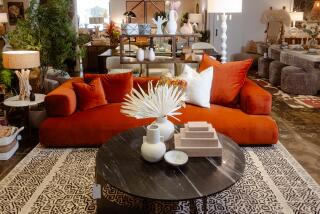Why are 200,000 parents desperate to buy this $229 couch for kids?
When 20-month-old Cruz Garcia’s parents, Vanessa and Daniel, bought him his first Nugget a little more than a year ago, it was as simple as clicking a button and typing in a credit card number. By the time the Long Beach family was ready to buy their third a few months later, the $229 modular children’s couch was sold out online; they were able to snag one in a limited-release “drop.”
Little did they realize how lucky they’d been.
Co-founded by David Baron, Ryan Cocca and Hannah Fussell, Nugget Comfort makes four-piece furniture out of slabs of open-cell polyurethane foam that can be configured into couches, forts, castles, beds or slides, among other things. Covered by microsuede in stylish colors like Daybreak (“a misty agave”) or Mayberry (“a modern mauve”), Nugget‘s furniture had already built a devoted fan base of parents — mostly moms — on Facebook, Instagram and Pinterest by last year’s holiday season, when the North Carolina company sold out of all colors at once.
But no one could have imagined just how much COVID-19, and the stay-at-home orders that followed, would supercharge Nugget’s popularity — to the point that would-be buyers are entering a long-odds lottery, or paying exorbitant markups on resale sites, just to get their hands on one.
With millions of kids stuck indoors, playgrounds closed and parents working remotely while desperately searching for ways to distract their children, the Nugget vaulted from a cute playroom accoutrement to a must-have item for tens of thousands of families. The company has had to quadruple its staff from 20 to around 80 people, move into a 100,000-square-foot manufacturing facility and rethink its sales model.
“Some might say it’s a little excessive,” said Vanessa Garcia, a 32-year-old graphic designer, of her family’s devotion to the product. “But it works for us. We’ve melded it into our lives. At one point we didn’t even have a couch and we just had the Nugget.”
When the pandemic hit, Nugget Comfort’s production staff was attempting to catch up on outstanding orders from last year. Instead, the company had to send the workers home for two months with pay and benefits.
The new-inventory drops through which the Garcias nabbed their third Nugget were a hit: During a restock in August, a record-breaking 100,000 people logged on to vie for 40,000 or so available units. But, worried the process felt too hectic and exclusive, the company sought a way to democratize it before this year’s holiday rush. The Nug Lotto was born.
From Oct. 23 to Dec. 11, the company will randomly draw 5,000 to 10,000 names a week and send out 60,000 Nuggets by Christmas. Although the lottery was intended to alleviate the scarcity problem, the result has been to whip the hype that much higher. One hundred thousand people registered in the first week, and that number has nearly doubled since.
As one Instagram user commented: “The moms have gone wild.”
“It’s a weird thing for us to talk about because obviously the pandemic is not a good thing,” Cocca, Nugget’s chief marketing officer, said. “But it’s inevitable that a popular indoor product for the family spending more time at home, and doing something creative and fulfilling together with their time, is even more of a household name ... than ever.”
Cocca and Baron came up with the idea for the Nugget when they were students at the University of North Carolina Chapel Hill around 2012. Initially, they saw it as an upgrade from the uncomfortable futons they would see trashed around campus once the semester ended. A 2014 Kickstarter campaign raised $84,748 on a $20,000 target.
But it wasn’t until Fussell, whom Cocca and Baron had known since their college days (and who is in a relationship with Cocca), joined the team as an intern in 2017 that Nugget found its niche.
Fussell had worked as an elementary school teacher, as well as with Teach for America.
“When I saw this product marketed as a college futon I was like, ‘Wrong,’” Fussell, now the company’s chief product officer, said. “As soon as I got one into my classroom, I was like ‘This is really something that unlocks so much opportunity and play and imagination in these kids.’”
Along with choosing some of the chic colors and patterns the Nugget is known for, Fussell provides the perspective of someone who’s worked with children — and their parents — for years.
“Being an educator is like doing customer service with families,” she said.
Cocca’s background is in streetwear. As a college student, he started a popular T-shirt brand called Thrill City, where he came up with new concepts every few months for fans who quickly bought out the limited runs.
He joined Nugget Comfort, in part, for a respite from the relentless product development rhythm. But that hasn’t stopped people from drawing parallels between Nugget and streetwear culture.
“Friends and people we know joke about it being the Supreme of the parent world,” he said, referring to the cult streetwear brand that was just acquired by VF Corp. for $2.1 billion.
Fussell and Cocca insist that none of this is intentional, but they see the overlap. They’ve been studying brands such as Jordan, Nike, Telfar Global and Gymshark for inspiration on how to meet insatiable demand.
“We have no benchmark in the furniture, nor baby product, nor kid product space, for this,” Fussell said.
Tyisha Roberts, a mom of three boys from Virginia, spent five hours in October trying to register for the Nug Lotto, her browser unable to load the necessary page.
“I was like, ‘I’m not doing this. This is ridiculous. This is for a kids toy,’” Roberts said.
Roberts, a stay-at-home mom who makes kids clothing on the side, has wanted to get her children (ages 7 months, 2 years and 7 years), a Nugget since 2018, when she first saw it being praised in her moms groups on Facebook.
Back then, Roberts couldn’t afford to spend $229 on a play couch, so she waited. By the time her family finally had the disposable funds this summer, and needed the furniture more than ever as her two oldest sons were wreaking havoc on her home, it was nearly impossible to get one.
When the Nug Lotto was announced, Roberts saw a glimmer of hope.
“There’s no way we’ll lose,” she thought. But a few weeks into the lottery, she’s still waiting.
“It makes me jealous,” Roberts admits. “Some people just had a baby or just heard about Nugget, and they already have one.”
She compares Nugget culture among moms online to high school: “Everybody wants to be a part of that little clique,” Roberts said. “Everybody wants to be the in-type of moms, the cool moms.”
On Facebook, there are more than 20 groups dedicated to buying, selling, trading or musing on all things Nugget.
Among the most popular are Nugget Comfort Chatter & BST, a 59,000-member fan-run group where “no consumer shaming” is allowed and people can buy, sell or trade the play couches. There’s the 21,000-member Nugget Comfort B/S/T & Babble, where “you can keep your negative opinions to yourself.” There’s Nugget Comfort FUN, where more than 11,000 members post action shots of Nuggets in use.
On sites such as Facebook Marketplace and OfferUp, Nuggets are being resold for $500 to $1,000. Roberts remembers the time she saw a single cover, not the actual couch, going for $1,000.
Daniel Garcia, who works as a barista, acknowledged the hard-to-get nature of the Nugget is part of what makes the couch so irresistible to parents like him.
“It’s an unintentional draw,” he said. “When you tell people they can’t have something it makes them want it more. Like little kids.”
More to Read
Inside the business of entertainment
The Wide Shot brings you news, analysis and insights on everything from streaming wars to production — and what it all means for the future.
You may occasionally receive promotional content from the Los Angeles Times.











